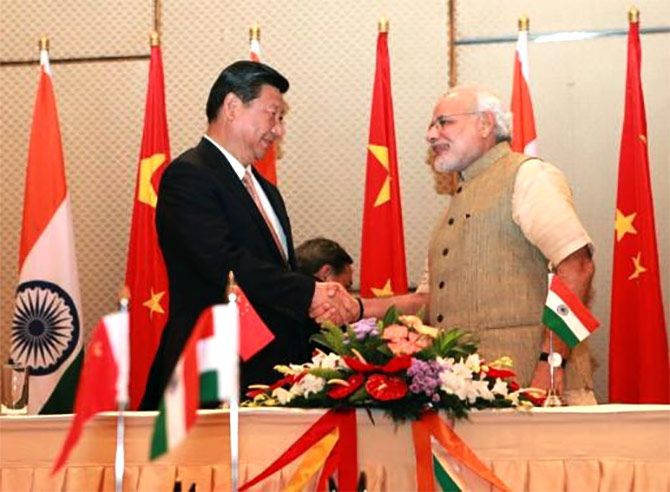
China's actions at the NSG will certainly taint India-China relations and enhance suspicion of China's intentions, says former senior RA&W officer Jayadeva Ranade.
As anticipated China did not yield ground in its sustained opposition to India's admission to the 48-member Nuclear Suppliers Group and has successfully had the matter deferred by at least a year. Prime Minister Narendra Modi's request during a 50-minute personal meeting with Chinese President Xi Jinping at Tashkent also predictably failed to make a dent in China's position.
Worth noting is that on this occasion Beijing's opposition has been direct and overt unlike in the past where it preferred to avoid being the sole country opposing India. Its stance, however, did shift often.
From insisting that there should be no exception for India, to advocating parity in treatment for India and Pakistan, to asserting that India is ineligible since it has not signed the Non-Proliferation Treaty, it finally suggested that India and Pakistan must both comply with the pre-condition of signing the NPT.
Beijing stayed consistent in its opposition to India's entry though it sought to retain a gossamer-thin facade of acting 'on a matter of principle'. Other countries later joined China in opposing India's entry.
The main factors motivating Beijing's action are:
1. Its ambition to remain the only nation in Asia with unrivalled international influence and membership of elite groupings like the United Nations Security Council and NSG;
2. Signalling to the US that its writ is no longer unquestioned across the world and can be successfully challenged by China -- which Beijing hopes will bolster its effort to get the US to acquiesce to its proposal of a 'new type of big power relations.'
3. Prevent India from elevating its global stature by entering the NSG, thus reinforcing its bid to enter the UNSC;
4. Trying to keep India's growth restrained by Pakistan and treating the two as on par;
5. Demonstrating to Pakistan -- and other countries that it has designated as 'friends' after the closed-door Conference on Peripheral Diplomacy held in Beijing in October 2013 -- the benefits that accrue from allying with China.
China's enhanced relationship with Pakistan has been a definite additional factor. A series of indicators over past months showed that Beijing will not waver in its diplomatic and other support to Pakistan.
In the case of the NSG, therefore, it has not so much been a case of Pakistan lobbying China as China using Pakistan to keep the pressure on India while cementing its bonds with Islamabad.
The first public demonstration of Beijing's hardened attitude towards India was when in April 2015, Xi Jinping announced the China-Pakistan Economic Corridor.
The decision to build numerous infrastructure projects in Pakistan occupied Kashmir, Gilgit and Baltistan effectively meant China had dispelled its decades-long ambiguity on the Kashmir issue and sided with Pakistan.
Xi thus ignored India's sovereignty and territorial claims. Since then China began describing Pakistan as its 'only friend and ally.' High-ranking Chinese interlocutors also clearly conveyed in May 2015, that 'India must ease tensions with Pakistan and resolve the Kashmir dispute' for India-China ties to improve.
China additionally quite obviously put settlement of the Sino-Indian border dispute on the back-burner.
There have been other indicators and of particular interest was the meeting scheduled between Xi and Pakistan Prime Minister Nawaz Sharif on the sidelines of the Nuclear Security Summit in Washington on March 31-April 1. While Sharif finally could not travel to Washington, there was a credible report that Xi and he were to discuss 'extending diplomatic or other substantive support' to Pakistan to counter US insistence that Pakistan goes slow on development of its tactical nuclear weapons.
This implied not only that Beijing was gearing to take on the US, but that the two would collude to prevent India's entry to the Nuclear Suppliers Group.
China placing a hold at the UN Sanctions Committee on the case of Jaish-e-Mohammed chief Masood Azhar was another indicator. It came after Modi had earlier personally raised with Xi the case of China blocking India's request asking Pakistan how Lashkar-e-Tayiba terrorist Zaki-ur Rahman Lakhvi had posted bail and its courts had set him free.
These actions came after China had earlier blocked India's requests to list Syed Salahuddin of the United Jihad Council and investigation of the source of Lashkar-e-Tayiba terrorist Muhammad Saeed's funds despite financial sanctions. China's actions demonstrated that China's selective attitude towards counter-terrorism and support to Pakistan had not changed.
The visit by a Chinese navy nuclear submarine to Karachi -- the first to a port in South Asia -- late this May similarly publicised the very close military ties forged between China and Pakistan. It additionally exhibits China's ambitions in the Indian Ocean and Arabian Sea and Pakistan's readiness to cooperate.
While China and Pakistan worked together to prevent India's entry to the NSG -- as they are colluding to block India's admission to the UN Security Council -- if India is denied its rightful membership of the NSG it would mean that the NSG has also chosen to ignore the continuing brazen violations of international missile and nuclear non-proliferation norms by Pakistan and China.
China's actions will certainly taint India-China bilateral relations and enhance suspicion of China's intentions.
A fresh clear-eyed and objective evaluation of the India-China relationship is necessary, especially as India tries to correct adversely balanced bilateral economic ties and the two countries engage over the long term.
Jayadeva Ranade, former additional secretary in the Cabinet Secretariat, Government of India, is president of the Centre for China Analysis and Strategy.










